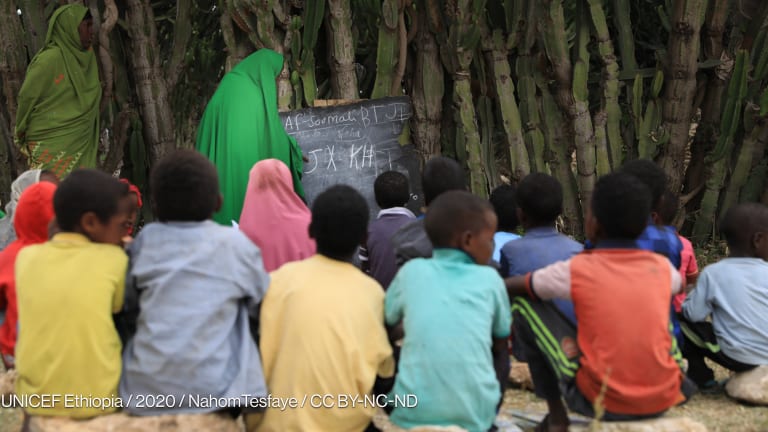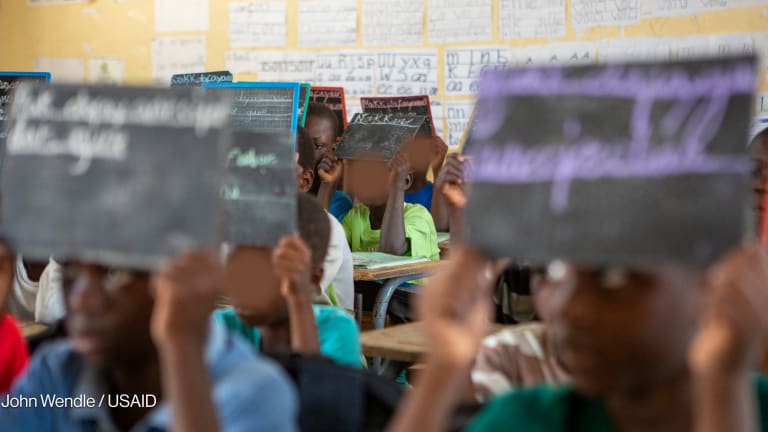
LONDON — India’s decision to rejoin a prestigious global education ranking has been welcomed by education experts as a positive signal, but some questioned whether the move will bring about meaningful reform.
In January, the Indian government announced its plan to rejoin the Program for International Student Assessment, or PISA, after a 10-year absence. The country dropped out of the ranking, run by the Organisation for Economic Co-operation and Development, in 2009 after being placed 72nd out of 74 nations.
“That there is willingness to re-engage with PISA is a good thing. However, the way it is being done ... [suggests] an unwillingness to confront the problem in its entirety.”
— Yamini Aiyar, president of the Accountability Initiative, Centre for Policy ResearchIndia was competing against high-income OECD member countries but also non-OECD countries including Brazil, China, Thailand, Indonesia, and Vietnam. The government claimed the test was unfair because it had not been sufficiently adapted to the Indian context.
OECD and India have now agreed to try again and a group of 15-year-olds from schools across Chandigarh, the capital of the northern Indian states of Punjab and Haryana, will be evaluated by PISA examiners in 2021. India wants pupils from its system of central government schools, known as Kendriya Vidyalayas and Navodaya Vidyalayas, to take the test.
The government has said that participating in PISA will help to assess the health of its education system, motivate schools and states to do better, and improve learning levels across the country. The test will also move India away from rote learning toward more “competency-based examination reforms,” according to a press release issued for the official signing ceremony last month.
According to the latest Annual Status Of Education Report 2018, school enrolment in India is up but the quality is often poor and is getting worse in some places. Nationally, only about half of children can read, and less than a third can do basic arithmetic, according to the report.
Education advocates said the move suggests India is serious about improving its learning outcomes. However, some also raised concerns about the integrity of the assessment given the types of schools being tested and the fact that only one city has been chosen.
“That there is willingness to re-engage with PISA is a good thing. However, the way it is being done, limiting it to only certain kinds of schools and one city … [suggests] an unwillingness to confront the problem in its entirety on an international stage, and [instead to] try as much as possible to showcase our best,” said Yamini Aiyar, president of the Accountability Initiative at Indian think tank, the Centre for Policy Research.
PISA is not the only global ranking India has boycotted after performing poorly. Last year, the government rejected the World Bank’s Human Capital index after coming 115th out of 157 countries. In a statement, the Indian finance ministry criticized the HCI and said it would ignore the results.
The decision to rejoin PISA will help India adjust its education model, since “PISA offers a different style of learning, one which looks not at what you know but what [you] can do with the knowledge,” Andreas Schleicher, OECD’s director of education, told Devex. But PISA will also learn from India, he added.
When India last took part in PISA in 2009, Schleicher said the process had been rushed and “implemented without much contextualization.” This time, OECD and the Indian ministry of education will work together to make sure the two-hour test is “culturally adapted,” he said.
Asked whether the schools and city selected by India for PISA testing offer an accurate picture of the country’s education system, the OECD official said there was “no expectation” that the first scores would represent the entire country and that the sample would be progressively expanded. For example, when China first joined, only schools in Shanghai were tested and it has since been rolled out to other provinces, he said.
More on education:
► Jaime Saavedra: 'There's nothing soft about education reform'
Anit Mukherjee, a policy fellow focusing on education at the Center for Global Development, told Devex that by having Kendriya Vidyalayas and Navodaya Vidyalayas schools take part in the test, the government is trying to have more control over the sample in the hopes of getting a better score. However, he said this is not unusual and that other countries have done the same.
“Learning outcome measurement across the world against a global benchmark is good … I would rather have India going to PISA in some way which is acceptable to both the government in India and OECD than to sit outside, otherwise we don’t have any comparator,” he said.
But even with its best government schools being tested, India is still likely to come near the bottom of the PISA table, according to Jishnu Das, education economist at the World Bank's Development Research Group. This won’t come as a surprise to the government, which is already aware of declining education scores over the past decade thanks to school assessments conducted by education research nonprofit ACER India, he said.
As a result, PISA may have limited value as the test has been most effective when its results have surprised a government — with “PISA shock” forcing them to institute education reforms, he said. This happened in Germany in 2001 and in Peru in 2012.
“PISA made a big difference in Germany, it really woke them up, but ... India is not going to be shocked when it comes near the bottom,” Das said. He added that “these international things cause some embarrassment in international circles but they [don’t] impact the discussion in India at all.”
A better method would be to apply PISA in each Indian state and rank them against each other, which would create more “debate and discussion,” he suggested.








